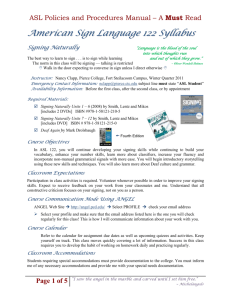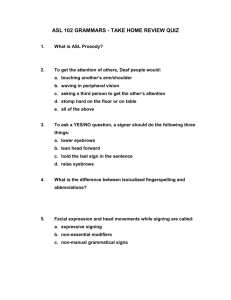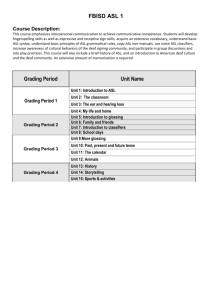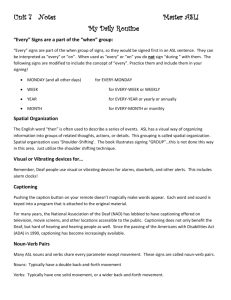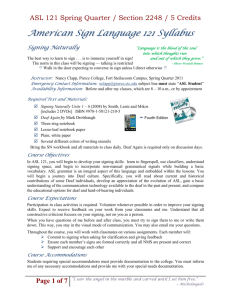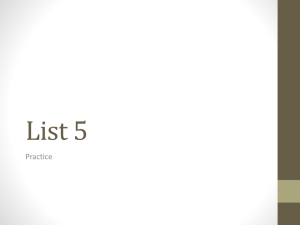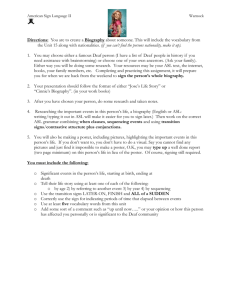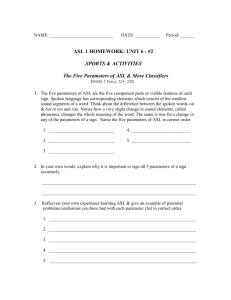ASL 122 Training Guide - Walla Walla Community College
advertisement
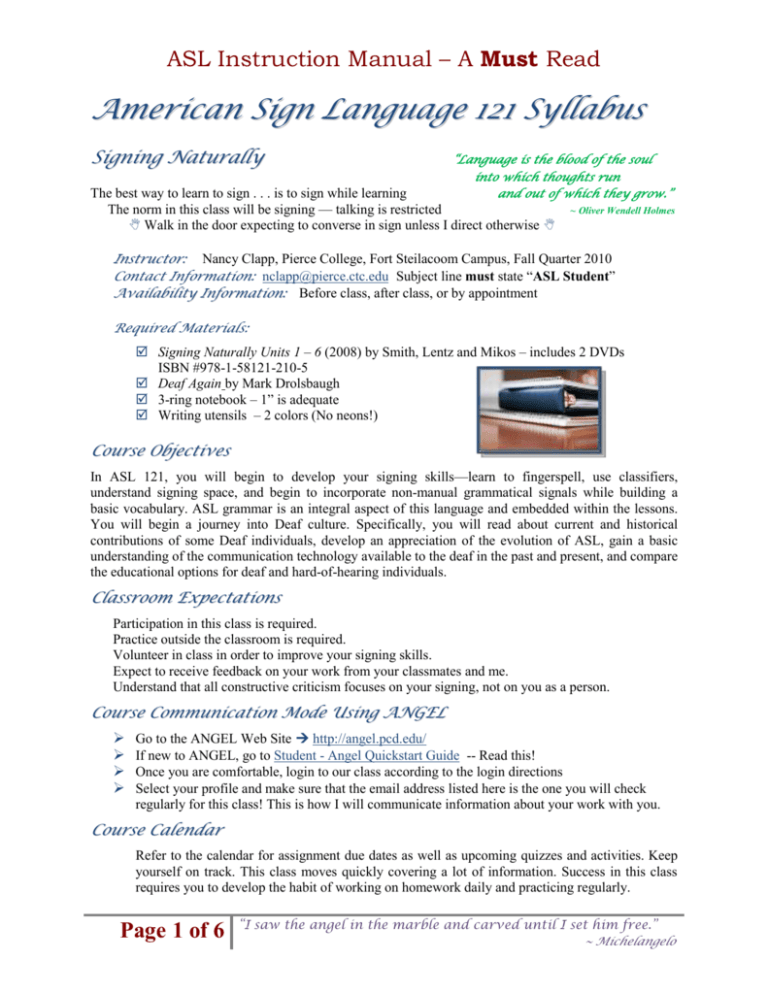
ASL Instruction Manual – A Must Read American Sign Language 121 Syllabus Signing Naturally “Language is the blood of the soul into which thoughts run and out of which they grow.” The best way to learn to sign . . . is to sign while learning The norm in this class will be signing — talking is restricted Walk in the door expecting to converse in sign unless I direct otherwise ~ Oliver Wendell Holmes Instructor: Nancy Clapp, Pierce College, Fort Steilacoom Campus, Fall Quarter 2010 Contact Information: nclapp@pierce.ctc.edu Subject line must state “ASL Student” Availability Information: Before class, after class, or by appointment Required Materials: Signing Naturally Units 1 – 6 (2008) by Smith, Lentz and Mikos – includes 2 DVDs ISBN #978-1-58121-210-5 Deaf Again by Mark Drolsbaugh 3-ring notebook – 1” is adequate Writing utensils – 2 colors (No neons!) Course Objectives In ASL 121, you will begin to develop your signing skills—learn to fingerspell, use classifiers, understand signing space, and begin to incorporate non-manual grammatical signals while building a basic vocabulary. ASL grammar is an integral aspect of this language and embedded within the lessons. You will begin a journey into Deaf culture. Specifically, you will read about current and historical contributions of some Deaf individuals, develop an appreciation of the evolution of ASL, gain a basic understanding of the communication technology available to the deaf in the past and present, and compare the educational options for deaf and hard-of-hearing individuals. Classroom Expectations Participation in this class is required. Practice outside the classroom is required. Volunteer in class in order to improve your signing skills. Expect to receive feedback on your work from your classmates and me. Understand that all constructive criticism focuses on your signing, not on you as a person. Course Communication Mode Using ANGEL Go to the ANGEL Web Site http://angel.pcd.edu/ If new to ANGEL, go to Student - Angel Quickstart Guide -- Read this! Once you are comfortable, login to our class according to the login directions Select your profile and make sure that the email address listed here is the one you will check regularly for this class! This is how I will communicate information about your work with you. Course Calendar Refer to the calendar for assignment due dates as well as upcoming quizzes and activities. Keep yourself on track. This class moves quickly covering a lot of information. Success in this class requires you to develop the habit of working on homework daily and practicing regularly. Page 1 of 6 “I saw the angel in the marble and carved until I set him free.” ~ Michelangelo ASL Instruction Manual – A Must Read Classroom Participation ASL is an interactive language that you can fully learn only by practicing with others and by participating in class activities. If you miss a class, you are responsible for getting work missed and new vocabulary introduced from your classmates. Classroom activities are vital for becoming more comfortable communicating with your hands, face and body. Please arrive to class on time prepared to learn. Arriving late causes a visual disruption for those who are on time and already using their eyes to learn. Be courteous. Arrive a few minutes early to settle, to prepare mentally for learning, and to begin communicating in sign with your peers. Class attendance is essential for success when learning any foreign language. We discuss and practice a considerable amount of material during class that is not present in the textbook or handouts. Absences hinder your learning and the learning of your team members, so plan to attend every class. I reserve the right to lower your grade to reflect attendance deficits. In-Class Learning Teams You will periodically form Learning Teams consisting of mixed or same skill levels. Each member will: Commit to signing when asking for clarification and giving feedback Ensure each member’s NMM are present and correct Ensure each member’s signs are formed correctly Ensure each member understands the new skill Support and encourage each other Plan for Success Vocabulary Practice You will practice the vocabulary from units 1 – 4. You should practice these at the beginning of each unit. Sign with each model to develop muscle memory. Once you know the signs, turn off the sound and practice voicing the signs. Specifically, think of the signs as used by different age groups including a young child, a teenager, an adult, a parent, a professional, a recent immigrant, and any other person for whom you may voice in the future. Do not become stuck with a “one sign, one word” mentality. This will cripple your ability to voice effectively and accurately. Example: Hello. Hi. Hey. These vocabulary lessons are found on two sources: 1. online at http://www.pierce.ctc.edu/staff/jstarr/files/ User name: asl Password: lessons 2. Signing Naturally DVD VR (vocabulary review) – located at the end of each unit Study Groups You must practice at least 30 minutes of voice-off signing two times each week with a class study group consisting of no more than four class members. Prior to each practice session, write down at least one goal you will work toward during that time. These sessions should focus on practicing what we learned in class. While vocabulary is important, I strongly suggest you practice signing sentences that incorporate the new vocabulary as well as practicing signing classifiers, numbers, grammatical topic/comment structure sentences, asking and answering questions, story assignments and other topics introduced throughout this course. I encourage you to switch groups periodically to gain a well-rounded, diverse learning experience. Obtain contact information in case you have an emergency and need to reschedule. Practice Logs You must keep a record of your practice sessions and submit practice logs weekly. I will fill out an example document and post it to ANGEL in addition to a blank document for your use. Open the document, save to your computer, type your information, resave, and submit the completed log as an attachment to ANGEL for me to assess. Page 2 of 6 “I saw the angel in the marble and carved until I set him free.” ~ Michelangelo ASL Instruction Manual – A Must Read Assignments-at-a-Glance Signing Naturally Workbook DVDs To gain the most benefit from the ASL DVDs, view the segments multiple times before resorting to checking your answers in the back of the book. This will improve your receptive signing skills. After correcting any errors, view the segments again to ensure you understand the material. Do not resort to watching these in slow motion. This could handicap your receptive ability. PLEASE NOTE: The course calendar shows which DVD assignments to submit for a grade and when they are due. Follow this schedule closely in order to understand your work in class. Video-Taped Stories You will record yourself signing stories from the Signing Naturally DVDs exactly as the models sign them. To receive the highest scores, you should copy the facial expressions, NMMs, and body shifts while producing the signs correctly and incorporating other components found in each story. I will provide you with the assignment requirements and the assessment rubrics early to give you plenty of time to practice and record your work. I will provide you with feedback on things you are doing well and on how you can improve your signing skills. You have many options for submitting your work. Using a webcam or video camera, you can email it to my Pierce email or Facebook accounts, post it to YouTube and send me the link and access code, burn it to a DVD, or put it on a thumbdrive. The school library has a couple of cameras you can borrow. The librarian can show you how to use it or you can ask me. A note about your recordings: Please include your head, shoulders, chest, waist, and only enough space around your body for your hands to be fully visible on the screen at all times. I need to be able to see your facial expressions clearly and view your sign production. If you are not close enough, you may receive a lower grade. Wear clothing that contrasts with your hands and record yourself in front of a neutral background with good lighting on your face and hands. Tracers in your recording will result in a lower grade. Receptive Practice The DVD, Narrative 121, contains stories told by Deaf instructors from South Central Community College. They created this video to show you how Deaf individuals tell stories. Using a variety of formats, you will create composite translations of many of these stories. Additionally, you will learn to translate from sign to gloss. I will provide the requirements as well as my assessment rubric for each translation. Deaf Culture Readings, Presentations, and Discussions You will engage in a variety of readings to enhance your knowledge of Deaf culture. Preparation for class discussions will include writing short paragraphs, answering questions, or creating an outline to use for presenting on the given topic. You must be present and contribute to the sharing of knowledge in order to receive credit on your readings and discussions. Community Event to Attend You will find various Deaf events posted on our Pierce ASL Facebook account. Login to your Facebook account and request a friendship confirmation in order to access this. We will do this together in class for those who need help. Once you gain access, choose an event and attend. Afterward, type and submit a one-paragraph summary that includes the event you attended; a summary of activities; and what you learned about the Deaf community, deafness, or ASL. Warning: Do not procrastinate. Page 3 of 6 “I saw the angel in the marble and carved until I set him free.” ~ Michelangelo ASL Instruction Manual – A Must Read Assessment Protocol For quizzes and exams, all signed information will occur twice unless accommodations are necessary. I will not repeat any missed signs if you come in after an assessment has begun. Please note: If you miss an assessment, you may only retake it for extenuating circumstances, which include a family emergency, a verifiable work conflict, or a severe illness. You are responsible for contacting me to schedule your make-up assessment no later than the next class you are able to attend. Vacations or going out of town do not constitute a valid reason for missing class. Please check your progress on ANGEL and alert me to any grade discrepancies immediately. Homework & Attendance Policy All Homework is Due at the Beginning of Class, in order to receive full credit. Homework received one class late will receive a grade of up to 75% only. Work received later than one class late receives a grade of 50%. Please note, I do not offer extra credit points. If you must be absent, you may email your assignment to me before class begins in order to receive full credit. Attending Class is Imperative! ASL is an interactive language that requires disciplined practice time with Deaf individuals and your signing peers as well as formal instruction. If you must miss a class, you are responsible for asking your peers for work missed and new vocabulary introduced. Ninety percent of your grade depends on completion of assignments that require your participation in class. Excused and Unexcused Absences May Negatively Affect Your Final Grade! Class attendance is essential for success in any foreign language class. We will discuss, practice, and review a considerable amount of material that you cannot feasibly make up. Cell phones are not allowed in class! If you have a family emergency, let me know before class, and you may leave your phone on the table in front of your work area. Do not answer your cell phone or text in class! Please wait until you are in the hallway to respond to the call. Those who receive a grade lower than 2.0 may not move up to ASL 122 Grade Point Equivalents TIP 100 – 95 = A 94 – 90 = A – 89 – 87 = B+ 86 – 84 = B 83 – 80 = B79 – 77 = C + ( 4.0 ) (3.9 – 3.5) (3.4 – 3.2) (3.1 – 2.9) (2.8 – 2.5) (2.4 – 2.2) 76 – 74 = C 73 – 70 = C – 69 – 67 = D+ 66 – 64 = D 63 – 60 = D59 – 0 = fail (2.1 – 1.9) (1.8 – 1.5) (1.4 – 1.2) (1.1 – 0.9) (0.8 – 0.7) ( 0.0 ) How to Study This Foreign Language Class Plan to study on your own at least 5 - 8 hours a week in addition to the weekly study group practice. When studying on your own, review old and new vocabulary by actually putting the concepts on your hands rather than just thinking about how you would sign them. Fingerspell objects around you to strengthen the hand-brain connection, review numbers in various situations, review handouts, practice NMS techniques, prepare for upcoming activities, do your homework, and do anything else you find helps you learn this language. Share your ideas with your classmates to encourage success for all. Classroom Accommodations Students requiring special accommodations must provide documentation to the college. You must inform me of any necessary accommodations and provide me with your special needs documentation. Page 4 of 6 “I saw the angel in the marble and carved until I set him free.” ~ Michelangelo ASL Instruction Manual – A Must Read My Closing Thoughts I will do everything I can to make your learning experience positive and productive. Feel free to contact me if you have any questions or concerns. Please make learning accessible for all by considering the learning needs of others and by doing your best at all times. I look forward to an exciting learning experience with each of you. My goal is to teach you to love learning this language and to know how to learn. My hope is to successfully launch you into the life-changing world of signing. “Education is learning . . . what you didn't even know . . . you didn't know.” A ASSL L ~ Daniel J. Boorstin Pierce College Mission Statement Welcome to Pierce College! We are a community of learners open to all. Our community is built on a foundation of respect and openness to change. Together we strive to meet the needs of our diverse community and develop each member’s abilities. Our commitment to quality education and teaching excellence prepares learners to live and work successfully in an ever-changing world Student with Disabilities Students with disabilities who believe they may need academic adjustments, auxiliary aids or services to fully participate in course activities or meet course requirements are encouraged to register with the Access and Disability Services (ADS) Office, Welcome Center, 3rd floor of the Cascade Building. You may also call the ADS Office to make an appointment to meet with the ADS Coordinator at (253) 964-6468 or 964-6526. Student Code of Conduct I do not condone any acts of academic dishonesty. DO NOT CHEAT! If you plagiarize another student’s work, I will follow the student discipline process as outlined in the student code of conduct. Snow Policy For weather issues, please refer to this web address to find out the status of Pierce College. http://schoolreport.org/#college Emergency Procedures for Classrooms Puyallup Campus Safety (253) 840-8481 http://www.pierce.ctc.edu/Safety/emp.php Call 911 and then Campus Safety in response to an imminent threat to persons or property. In the event of an evacuation (intermittent horns & strobes), gather all personal belongings and leave the building using the nearest available safe exit. Be prepared to be outside for one hour and stay a minimum of 200 feet from any building or structure. So long as it is safe to do so, students are expected to stay on campus and return to class after evacuations that last less than 15 minutes. Do not attempt to re-enter the building until instructed by an Evacuation Director (identified by orange vests) or by three horn blasts or bell rings. Please notify the nearest Campus Safety Officer or Evacuation Director of any one left in the building or in need of assistance. Page 5 of 6 “I saw the angel in the marble and carved until I set him free.” ~ Michelangelo
